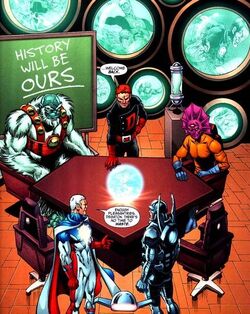The 20 top time wasters, stealers, nibblers, and how to nab them
 Friday, February 19, 2010 at 5:42PM
Friday, February 19, 2010 at 5:42PM "When I think of all the hours and hours of my life I have spent watching television, it makes me realize, Man, I am really rich with television." -- Jack Handey
In preparing for a media interview this week I rounded up the most common time wasters, which I thought I'd share with you. Next to each I've sketched briefly ideas for counteracting them. These come from various sources, including The Time Trap: The Classic Book on Time Management, The Naked Desk: Everything you need to strip away clutter, save time & get things done, and Never Check E-Mail In the Morning: And Other Unexpected Strategies for Making Your Work Life Work. I'm curious: What others do you find yourself dealing with? What methods do you use to combat them?
- Personal Disorganization. Adopt a system that efficiently handles your information and work-flows. A starting point: The World's Simplest Productivity Method, With Bonus Mini-Processing Examples.
- Multitasking. Stopping can be difficult, as it's a habit, but start with a Think, Try, Learn principle: Simply observe, which can lead to awareness and change. A tiny experiment: Keep a record of each time you task-switch, using hash marks. See if tracking it helps you change. Use Edison if you want some support and ideas while trying it out.
- Distractions. I distinguish two classes: Internal (thoughts and habits, such as constantly checking e-mail) and external (a poorly-configured environment, including clutter). Address the former through habit changing methods (Marilyn Paul has a nice section on the topic in It's Hard to Make a Difference When You Can't Find Your Keys) and the latter through managing each type (contact me for lots of ideas to solve). You might also enjoy Dave's How to Overcome Distractions Anytime, which is very TTL.
- Interruptions. These include "corporate drive-bys" (unvited drop-ins), some phone calls, and the email dinger. Try standing up when people come in, closing your door, moving temporarily to a private space, and turning off the phone and email alert.
- Meetings. Eliminate unnecessary ones, make sure there's action agenda, set (and enforce) clear time limits, and implement follow up methods.
- Many popular activities. Examples include games, TV, Facebook, Twitter, and (prepare yourself) news. (Side note: I've found the best way for me to be stoned in a workshop, worse than saying "Kill your TV," is "Kill your Netflix" :-)
- Perfectionism. Broad topic. Starting point: Experiment with doing a tiiiiiiny bit less-than-perfect job on one task. Remember, "Good enough" ain't bad!
- Poor communication. Examples include unclear emails, email back-and-forth (try the phone!), and phone tag. Try "pre-answering" questions that might come up, such as options and alternatives (e.g., days and times you're available for a meeting).
- No daily plan. I recommend my product, Where the !@#% did my day go? The ultimate guide to making every day a great workday. For fun, to the right is a sample from today
 .
. - Low-value information sources. games, RSS/information overload). go on a media diet. (You might enjoy Information Provenance - The Missing Link Between Attention, RSS Feeds, And Value-based Filtering and try tallying your various inboxes.)
- No automation. Get a text expander for chrissakes! (I love TextExpander for my Mac, along with Gina in her Upgrade Your Life: The Lifehacker Guide to Working Smarter, Faster, Better.)
- Slow reading speed. Adopt a skimming method, which allows you to read most books in about an hour. See How To Read A Lot Of Books In A Short Time and A Reading Workflow Based On Leveen's "Little Guide".
- Wasted transition time. "Between" time is an opportunity to make progress on small tasks, such as reading, short phone calls, or going over paper documents. The trick is to anticipate these moments and carry the materials you'll need, such as "To Read" and project folders.
- Wasted driving/traveling time. A special case of transition time, commuting is an easy opportunity to improve yourself. Check out this and other tips at Mark's Tips for Car Travel.
- Trouble saying no. Remember that every additional commitment you accept must be balanced with something else on your plate. When you say yes, you either need to drop an equivalent project or be prepared to allocate more time for the new one, which - I can guarantee - you don't have. Use your goals to guide you.
- Ineffective delegation. Here's a nice categorization of delegation that a client shared with me. He uses it to make the executive-assistant communication really zing. This is gold, folks:
- Examine the situation - report to me and I'll decide.
- Examine the situation - suggest alternatives and I'll decide.
- Decide and recommend best alternative - get my approval.
- Handle the situation and report on your results.
- Handle the situation and report any challenges.
- Handle the situation - no need to report.
- Excessive socializing. I'll repeat Twitter and Facebook, in case you weren't paying attention above. Although I don't see how "sitting alone typing on the computer" is socializing. It's similar to "sitting alone and clicking the mouse" is like surfing. Not!
- Lack of self discipline. I like Steve Pavlina's definition, "Self-discipline is the ability to get yourself to take action regardless of your emotional state" (more here).
- Poor planning. Check out Simple Project Planning For Individuals: A Round-up.
- Procrastination. Procrastination ("an umbrella concept with multiple possible causes and deep underpinnings" - from How To Approach Solving Procrastination (Hint: Think Magnifying Glass, Not Tips & Tricks)) is a major topic. If you find significant time wasted here, make managing it a new project. Contact me for some experiment ideas. Related: Use The STING Method To Stop Procrastinating, and Some Thoughts On "Eat That Frog!" By Brian Tracy.


